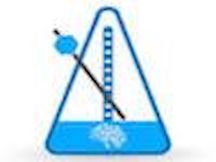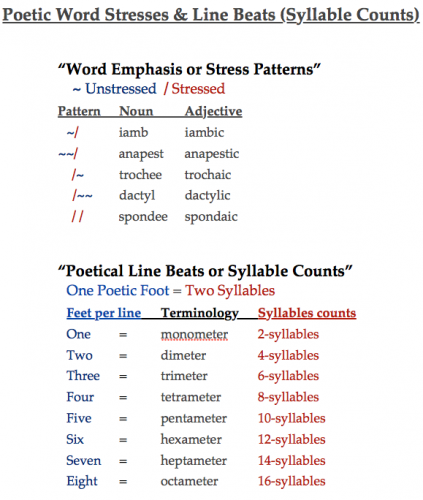
LESSON II. What Is Meter?A Lesson by Richard🖌 Is meter in poetry necessary? Why is meter important?  II. What Is Meter & Why Is It Important? Richard W. Jenkins, Poet Laureate Emeritus, Int'l Poetry Workshop ©2019 English is possibly the most difficult language of all in which to write poetry. Unlike other languages, it does not have a rhythm or a natural rhyme … so, in this age of fast everything's, and in the haste to write poetry, it is possibly the reason why meter and rhyme has become ignored and free form is so popular. I am not saying that Poetic Prose, Free Verse, or Free Style are any less poetry than metered and rhyming poetry. What I am saying is that poetry is a skill and takes time to master, regardless the form. Not only does it take time to learn the physical/technical skills of writing, but also the mental skills that separate the master from the apprentice, or the genius from the mundane. Free Form poetry, in the hands of a skilled wordsmith, has the potential to be amazing poetry, because of its freedom of format and to express and illuminate thought, feeling, emotion, and metaphorical imagery, etc; but, unless the wordsmith has the properly prepared skill and training, the majority of it is not even potentially fit for greeting cards. –––––––––––––––––––––––––––––––––––––––––––––––––––––––––––––––––––––––– Meter/Cadence/Tempo/Rhythm/Flow Without some sort of meter, poetry lacks in rhythm, flow, or musicality, etc; those very aspects of poetry that make it smooth and enjoyable to the mind's-eye appeal of most readers. You'll often hear of "metered and unmetered poetry" … but, in fact, all well-written poetry has a certain kind of meter, tempo, rhythm, or flow, even Free Verse and Poetic Prose, or it would take-on a jerky, disjointed, stuttering, tripping feel when read aloud or internally. When one says, "metered", they are typically referring to lines composed in a set number of syllables, such as the Ballad, which is composed in Quatrain form (4-line verses) of eight-syllables, six-syllables, eight-syllables, and six-syllables, correctly displayed thusly: 8/6/8/6, which gives the lines a consistent, even, rhythm and flow of up and down beat or tempo. To illustrate this, let's examine two verses … one unmetered and one metered … both expressing the same meanings: (unmetered) Rhythms softly flowing are all right there inside my heart only that you and I can ever really hope to hear. And we will be promised a whole eternity that we can hold onto all those little things so dear. (metered) Soft rhythms flow within my heart no one but us can hear. We're promised an eternity for all that we hold dear. Now, compare the two verses: The first verse would be composed by a novice, unenlightened in the finer nuances of how to compose elegant poetry, and it reads rather awkwardly and complicated in spots, wordy, and disjointed in flow. Whereas, the second verse, as you can easily see, has a natural-feeling flow to its lines, is well-structured in 8/6/8/6 count, where there is order, is less complicated, easier to read and understand, and is more conservative in wording than verse one, composed in 13/12/11/14 counts. This example is not unrealistic, as the first verse would be written by a novice, passionate in their emotions, but unenlightened in the finer nuances of how to compose smoothly flowing poetry … the second by a skilled and educated poetry writer, with a refined knowledge of rhythm, meter, and musicality. For instance, if I were reviewing the first verse, and said the things I just did about it, I would not be unfairly criticizing, but stating facts pertaining to it … though, I would never actually put it in that harsh a manner to a poetess or poet of their earnest work. But, you get my drift here, I'm sure. Next, let's consider some Free Verse: A poetic form free of rhymes that has no set meter (pay close attention to the word "set"). We'll again study two different verses expressing the same thing: You love bubble baths and I know why you do It's because they bring you joy, plus, they leave a sly smile making the corners of your mouth curl up, too – bubble baths are playful, inviting, and they are seductive, enticing you to slip down slowwwly into the warm, embracing water … I know why you love bubble baths! It's the joy they bring, the sly smile they leave curling at the corners of your mouth – playful, inviting, seductive, as you slip slowwwly down … As you can see, verse one is involved and complicated, more like talking, wordy and lacking in natural flow and rhythm … while verse two is more condensed, simplified, and free-flowing. Although, Free Verse poetry has no "set" meter, it has flow, rhythm, and line-breaks (a natural place in a line that enjambs or breaks on to the next line, most often where, in normal conversation, there would be a breath or a comfortable instant where the rhythm of speech would normally pause); effectively, serving the same basic purpose or premise as metered poetry – to keep the rhythm and flow smooth and even … except, in Free Verse poetry, the natural line-breaks (along with syntax and diction) determine the meter/rhythm, flow, etc. As illustrated, verse one has unnatural line-breaks in awkward places, while verse two displays its line-breaks naturally and smoothly in places so as not to interrupt/trip the reader's natural rhythm and flow of concentration, thought, feeling, and so forth. From this, we can come away with the understanding that there is structured and unstructured meter; though, technically, this is an incorrect description. But, as poets, we now know better, eh? ; ) Kinds of Poetic Meter There are numerous kinds of poetic meters, the most basic being Free Meter: simply syllable counts per line, as opposed to set pattern of cadence or impressed beat as those specified in Blank Verse or Sonnets, which are composed in an exact meter (iambic pentameter [short/LONG vowel] 10-count meter), which requires considerably more practice and skill than Free Meter. Here is an example verse of Free Meter Poetry in 8/6/8/6 count: Feeling it fall upon my hand, a teardrop soft and warm; not the usual salty tear, it fell there to inform. FEELing it FALL upON my HAND, a TEARdrop SOFT and WARM; NOT the USuAL SALty TEAR, it FELL there TO inFORM. (lowercase syllables unstressed/STRESSED syllables in uppercase) As you can see, in Free Meter format there is no particular order requirement to un-stress or STRESS short/LONG vowel sounds. Here is the same verse in required "set" meter unstressed/STRESSED (short/LONG vowel sounds) in Sonnet Meter (iambic pentameter 10-count meter): In feeling ~ felt it fall upon my hand, a teardrop from my cheek fell soft and warm; 'twas not the common salty tear to land, I knew at once, it fell there to inform. in FEELing ~ FELT it FALL upON my HAND a TEARdrop FROM my CHEEK fell SOFT and WARM; 'twas NOT the COMmon SALTy TEAR to LAND, i KNEW at ONCE, it FELL there TO inFORM. Below, is a handy chart I created for my poetry class students that you might want to copy and print for your own use and easy reference when writing "set" meter poems.
There are many metered forms of poetry; these are just simple examples to illustrate what meter/flow/rhythm is and why it's so important when composing more refined, exemplary poetry correctly, and there are many variations of meter. Some forms require shorter or longer meter, some a mixture of meter, and others ascending or descending meter … the world of poetry is virtually endless. You can spend a lifetime learning, practicing, and enjoying the art of metered poetry, and never know a dull moment while immersed in the wonder of it all. –––––––––––––––––––––––––––––––––––––––––––––––––––––––––––––––––––––––– Be sure to ask any questions you might have, and/or to discuss anything you believe is incorrect in my lessons or which you disagree with. Dialogue is the best way to properly learn and understand. I am "always" open for discussion. : ) Please, share your thoughts and leave feedback, as this is the only way I know if I've done poorly or well, and I need your input to learn and grow from. Thank you for reading my lessons. (Don't forget to check out my Blogs on poetry.) Anything else you'd like lessons on? Let me know.  Comments
|
Stats
414 Views
12 Subscribers Added on April 27, 2019 Last Updated on October 11, 2022
|


 Flag Course
Flag Course